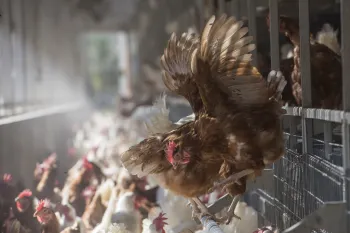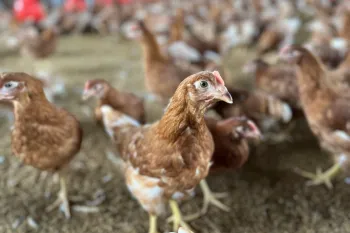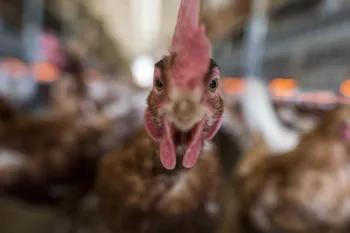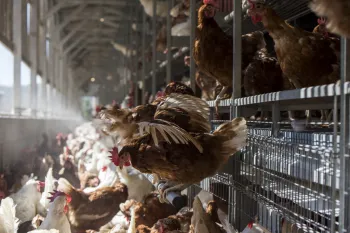We just hit another milestone in our work to improve the lives of farm animals: According to the latest statistics from the U.S. Department of Agriculture, more than 40% of hens used for eggs in the U.S. are now cage-free. We and our allies are transforming this massive $10 billion industry. Just 15 years ago, only 3% of hens used commercially were cage-free. This shift means that more than 100 million hens every year are spared from suffering in cages.
This is a major accomplishment, and we are proud to have been a part of this change for animals. But most egg-laying hens around the world are still kept in cage systems, which means they are confined to a space roughly the size of a microwave with as many as nine other birds. A hen in a battery cage is unable to even spread her wings and spends her entire life standing on metal wire, which digs into her feet. She eats, stands, sleeps and defecates in the same tiny space, denied the ability to carry out behaviors that are essential to her mental and physical welfare, such as dustbathing, walking and perching. While cage-free standards aren’t necessarily ideal, they’re a vast improvement over the hellish conditions of a cage.
This milestone not only marks an improvement in welfare for millions of hens, but it is also a reflection of our evolving society, which is more and more concerned with how animals are treated. Many people, regardless of their dietary choices, recognize that farmed animals should not have to suffer lifelong torment in order to produce our food. According to research, “chickens are just as cognitively, emotionally and socially complex as most other birds and mammals.” People who have interacted with chickens know that they are fascinating animals with varying personalities, and that mother hens are also known for being very devoted to and protective of their chicks. And Americans of all backgrounds and political persuasions support a shift to cage-free.
We’ve led successful campaigns to ban the caging of hens in 11 states that span the political spectrum. And the laws in eight of those states require eggs sold within their borders to also be cage-free. This year, laws from three of those states—Nevada, Oregon and Washington—went into effect, further bolstering cage-free demand.
We also continue to push the largest food companies, restaurants and grocery chains to fulfill their commitments to go cage-free; just this year, we’ve been making progress with Cheesecake Factory, Dollar Tree, Starbuck’s, Aramark and Disney.
Together, we’ve reached this extraordinary percentage shift by increasing public awareness and concern, translating them into reforms at the corporate and public policy levels as well as in the consumer marketplace.
We won’t stop our efforts to permanently shift the way eggs are produced until there isn’t a single hen suffering in a cage.
Follow Kitty Block @HSUSKittyBlock.




